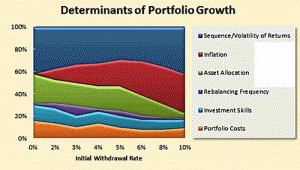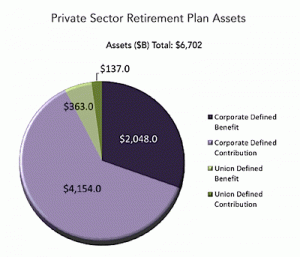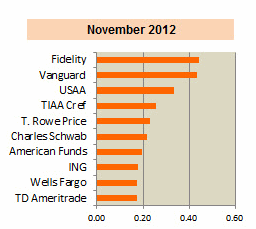Featured
The exit from the Fed’s QE and zero-interest-rate policies will be treacherous, writes this NYU Stern School of Business economist. Exiting too fast will crash the real economy, while...
Should ERISA regulations extend to rollover IRAs?
Americans move about $300 billion from 401(k) plans to rollover IRAs every year. That’s good for brokerage firms but it leads to higher fees and less protection for savers,...
Vanguard’s Ken Volpert on Bonds
As everyone knows, bond yields are slim and none. In a brief video, Ken Volpert (pictured), head of the Vanguard Fixed Income Group, reviews the financial and economic factors...
I Survived the Frontline Broadcast
The expose's whole approach implied, sadly, that even after three decades of exposure to and participation in 401(k) programs, most Americans are still in the dark about them.
A Chat with Nationwide’s Eric Henderson
"We’re trying to innovate around the concept of combining and creating a single product," Henderson told RIJ.
Greetings from New Orleans
At the LIMRA-LOMA-SoA Retirement Industry Conference in the 'Big Easy' this morning, Bob Kerzner sprang the news that his organizations will sponsor a new retirement designation--for home office employees,...
Principal Financial Joins the DIA Club
The Principal Financial Group is stepping up its individual retirement income business by introducing a new deferred income annuity and engaging annuity consultant Moshe Milevsky, vice president Jerry Patterson...
Unconventional Wisdom
In his latest monograph, which isn’t as scary to read as its title suggests, Toronto-area advisor/researcher Jim Otar challenges the intellectual bases for Monte Carlo forecasting, asset allocation strategies...
An Interest Rate Menagerie
As an advisor, I’m trying to delicately balance the advice of both Malkiel and Bernstein by squeezing out a bit of extra yield—just a bit—without taking undue risk.
I’ll Let You Work Out the Details
Is it really true that if you cap a small business owner's tax-deferred retirement accounts at $3 million, he or she will stop offering a plan at all? Sounds...
Funny Money and the Super-Rich
The publisher of The Prudent Bear website blames U.S. monetary policy for empowering tasteless parvenus to leverage their way to the top—or at least onto the Forbes 400.
Participants Still Wary of Equity Risk: Spectrem Group
In 2012, 401(k) participants held 36% of their assets in diversified equities and another 13% in company stock. In 2006, these investors had 40% of their assets in diversified...
Brand Conscious, But in Different Ways
Affluent investors seem to love direct retirement product providers, but advisors’ favorite brands vary by distribution channel. Everyone seems to like American Funds.
What Happens When Rates Rise?
The low interest rate on long-term Treasury bonds has also boosted demand for equities, farm land, high-yield corporate bonds, gold, and real estate. When interest rates rise, the prices...
What Happens When Rates Rise?
The low interest rate on long-term Treasury bonds has also boosted demand for equities, farm land, high-yield corporate bonds, gold, and real estate. When interest rates rise, the prices...
The Demographics of Wealth and Poverty
The Census Bureau says that 83% of U.S. households had less than $589,000 in non-home wealth in 2011 and 50% had less than $16,942.
Buybacks are Buoying the Bull
Something other than fundamental value is driving the stock market, warns the chairman of TrimTabs Investment Research and portfolio manager of the TrimTabs Float Shrink ETF.
Income-Generating Annuities Prospered in 2012
Investors are avoiding low-yield, accumulation-style fixed deferred annuities. Meanwhile, babyboomers seem to be flocking to fixed indexed annuities with rich living benefits or to deferred income annuities. Both provide...
Was That a Prohibited Transaction?
We all think we know right from wrong. But in the ERISA world, it’s not always so easy tell the difference. Listen to these war stories and decide for...
The Opposite of Austerity
The respected Yale economist argues that temporarily higher taxes and higher spending is a better path to recovery than permanently lower taxes and lower spending.





